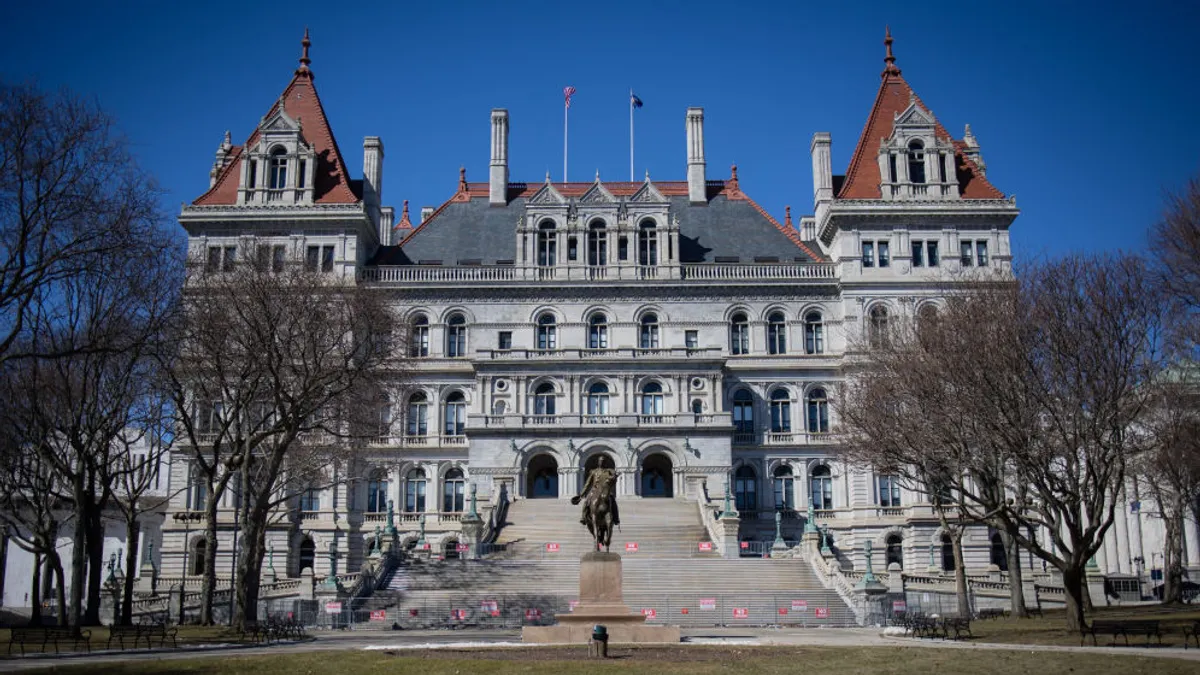Dive Brief:
- The state of New York reintroduced a pair of bills last week that call for climate risk and greenhouse gas emissions disclosures from large companies doing business in the state.
- The Climate Corporate Data Accountability Act — or Senate Bill 3456 — would require entities whose revenue exceeded $1 billion in the prior fiscal year to disclose their carbon footprint if they do business or derive receipts from business activities in the Empire State. This revenue includes, but is not limited to, income received by subsidiaries of an entity that does business in New York. An earlier iteration of the bill was initially introduced in January 2023.
- Another bill focused on climate-related financial risk reporting — Senate Bill 3697 — requires disclosures from any entity formed under U.S. law and doing business in New York whose prior fiscal year total revenues exceed $500 million. An earlier iteration was introduced in October 2023.
Dive Insight:
New York State Sen. Brad Hoylman-Sigal introduced SB 3456 on Jan. 27, while Sen. James Sanders Jr. introduced SB 3697 on Jan. 29. Neither bill advanced beyond the senate committee they were presented to when first introduced in 2023.
Both climate bills were presented to the State Senate’s Environmental Conservation Committee last week and are generally aligned with climate disclosure laws adopted by California in October 2023. The New York bills, however, offer varying reporting timelines.
Entities with more than $1 billion in total revenues would be required to annually disclose their direct and indirect greenhouse emissions. Scope 1 and 2 emissions data would need to be disclosed starting 2027 for the prior fiscal year while scope 3 emissions data would need to be disclosed starting 2028 for the prior fiscal year, according to SB 3456 .
The bill does have certain exceptions for entities incorporated outside of New York. An out-of-state entity would not be considered as doing business in the state if it is only carrying out activities outlined in subsection (b) of section 1301 of the New York Business Corporation Law. These include an entity maintaining or defending an action or proceeding; holding meetings of its directors or shareholders; distributing information to these members; maintaining bank accounts and offices or agencies “only for the transfer, exchange and registration of its securities, or appointing and maintaining trustees or depositaries with relation to its securities.”
To comply with the Climate Corporate Data Accountability Act, entities would have to measure and report their emissions using the Greenhouse Gas Protocol’s Corporate Accounting and Reporting Standard and Corporate Value Chain (Scope 3) Accounting and Reporting Standard. However, the bill states that the New York State Department of Environmental Conservation could adopt a “globally recognized alternative accounting and reporting standard” starting in 2034, if the state determined its use would more effectively support the objectives laid out in the act.
SB 3697, on the other hand, focuses more on requiring entities with at least $500 million in total revenues to prepare reports on their climate-related financial risk. The reports would need to include disclosures aligned with the Task Force on Climate-related Financial Disclosures framework or another equivalent reporting requirement, according to the bill submitted Jan. 29. These reports would also need to detail measures adopted by the covered entity to reduce and adapt to its disclosed climate-related financial risk.
The second climate-risk disclosure bill also states that if a covered entity does not produce a report consistent with the required disclosures, it is expected to “provide the recommended disclosures to the best of its ability, provide a detailed explanation for any reporting gaps, and describe steps the covered entity will take to prepare complete disclosures.”
SB 3697 would also require entities to make their reports “publicly accessible” and publish them on their respective websites. Entities would be expected to report biennially starting January 2028, according to the bill.
Law firm Ropes & Gray noted that the bills should be on companies’ watch lists, but that it would be “premature to take compliance steps beyond that,” given the bills are still in the beginning stage.
“The predecessor bills of course were not adopted and it is unclear whether the current bills will gain traction, especially since they cover largely the same universe of companies as are required to report under California’s climate disclosure laws,” the law firm said in an analysis published Monday.
Ropes & Gray attorneys added that if the New York climate bills are adopted in their current form, they would “not require much of an incremental compliance lift by most companies” due to their “significant overlap” with California’s climate bills. Some companies complying with California’s climate-risk and greenhouse gas emissions disclosure laws will be expected to make disclosures as early as 2026.
The New York climate bills were introduced to the state senate about a week after President Donald Trump began his second term in the White House on Jan. 20.
Trump kickstarted his first day with a bang and signed a flurry of executive orders that signaled an entirely different course of action from his predecessor on federal climate policy. Among these included orders to once again withdraw the U.S. from the Paris Agreement; declare a national “energy emergency;” pause all wind power development; and suspend all funding disbursements related to the Inflation Reduction Act and the Bipartisan Infrastructure Law.










